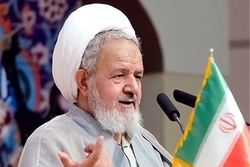 Hojjat al-Islam Sa'idi, “Imam Khomeini's movement was similar to the movement of the Prophet.”
Hojjat al-Islam Sa'idi, “Imam Khomeini's movement was similar to the movement of the Prophet.” RNA - Referring to the similarities of the Islamic Revolution to the Prophet Muhammad’s (PBUH) movement, Hojjat al-Eslam Ali Sa'idi, head of the Ideological−Political office of the Commander-in-Chief of the Iranian Armed Forces, Ayatollah Khamenei said, “The first major achievement of Iranian Islamic revolution is the changing of the nature of the system of government and Imam Khomeini’s masterpiece was changing the Imperial system which was a secular, and anti-religious system and transforming it into a religious one.”
He added, “The Prophet Muhammad converted a system of Shirk (polytheism as a sin in Islam) and disbelief into a religious system”, and said, “Imam Khomeini did the same thing that the Prophet Muhammad (pbuh) did.”
“The transformation in the legislative system is another transformation that the Islamic revolution has been pursuing and this system should be based on Sharia law. We believe that the law of sharia covers all aspects of human life. The rule of law was at the time of the Shah based on individual views and many of the MPs at that time were Freemasonry spies. But Imam Khomeini determined the rules according to religion”, Hojjat al-Eslam Ali Sa'idi told the clergies of the Sisters’ Seminary in Isfahan.
“Marx had called the religion as the opium of the people, but Imam Khomeini proved that not only religion is not the opium but also a major motive for the movements, and Marxism and liberalism are the two edges of scissors to eliminate the religion. Imam Khomeini proved that religion can change the world. One of the developments in the Islamic Revolution was the revival of the religion of Islam. Imam Khomeini drove religion out of isolation and presented it to the world”, he concluded.
Rasa News Agency
R847/979